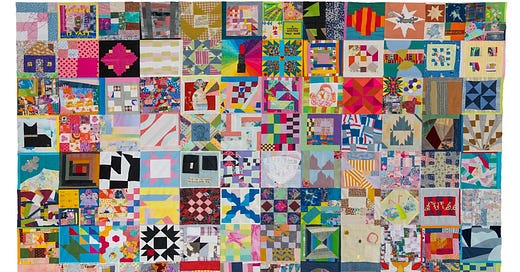Stitching together trans joy across geographies with the Euphoria Quilt
Since 2023, the Euphoria Quilt has grown into a 165-block quilt representing over 40 states and 5 countries, stitched together through a cross-country series of quilting bees.
The Euphoria Quilt is a powerful cross-country project centering trans & queer voices, community, and creativity. I’ve been an admirer since coming across the project in an Instagram search in 2023, when I was just starting out in my own fiber arts practice and in my role at Art of the Rural.
Launched in 2023, the Euphoria Quilt “aims to be a communal archive of gender-expansive joy during a time of unprecedented persecution and scapegoating of trans and gender-variant people,” as explained on the project website.
Given the Euphoria Quilt’s many submissions from across the United States and beyond, and last year’s quilting bees all over the country, I was curious to learn more about the quilt’s inspirations and organizers’ experience of geography. In late April, I hopped on Zoom with project creator and lead organizer Eliot Anderberg to learn more.
“Joy is something that I think about a lot,” says Eliot, reflecting on the inspirations of the project - and not giving power to how scary things are for trans folks. “Joy is my goal and my guide.”
At its heart, the quilt began from a question: what does gender expansive joy look like? How can delight be conveyed aesthetically, and what can it teach?

Quilt block submissions were open from June to October 2023. Eliot assumed they would “maybe” get 12 quilt block submissions - but then they got 50, then 80, and then the 165 total blocks making up the quilt.
The Euphoria Quilt is 12 feet wide and 11 feet tall, with over 150 quilters, 40 states, and 5 countries represented. Some blocks come from rural areas, though the majority come from Philadelphia, Albuquerque (where Eliot has lived the past 5 years), and Chicago.
Still ongoing, a series of cross-country quilting bees has brought the quilt to 9 cities, including more this summer in the Pacific Northwest. Come summer 2026, Eliot plans to host bees throughout the Midwest and the South. Most of the bees so far came about from proximity to Albuquerque, or were in locations where Eliot already had connections or travel plans. That said, a few - including New York City and Philadelphia - were by request and saw the biggest turnouts.
Close behind in attendance, though, were the quilting bees in Oklahoma and Utah - and Eliot was touched by the large turnout, and in general, the number of people who traveled long distances to join each of the bees.
“I love quilting because it’s a collaborative art form and always has been,” says Eliot. They note the prevalence of quilting in many families who have generational histories in the US, including their own family. Eliot was also inspired by conversations from the Seamside podcast by host Zak Foster, and in particular an episode with art historian Jess Bailey (a.k.a. @publiclibraryquilts) that discussed quilting as a collaborative, storytelling art form.
Quilting is a storied, social art, and quilting bees have a long tradition in quilting history, but have over time gone by the wayside - like many forms of communal gathering, Eliot notes. Given the meditative and intentional nature of hand-quilting, the method felt especially right to put together the Euphoria Quilt, especially as it grew so big that hand-sewing became the only way to put it together. Physically, Eliot needed help, and so they brought folks together.
Since quilting bees were predominantly attended by women, the Euphoria Quilt quilting bees reimagine and queer the gendered art form in a hands-on, communal way. Throughout assembling & touring with the quilt, Eliot found this project challenging the notion challenged that there are fewer queer people - or queer people living loudly - in rural areas and perceived conservative areas.
Throughout our discussion, I felt parallels between the Euphoria Quilt and the Kentucky Rural-Urban Exchange (RUX), especially given RUX’s ethos of bridging divides between diverse rural and urban folks to build relationships, tell stories, and find common ground through place-based - and often arts-based - experiences.
KY RUX has especially been a safe space for LGBTQ+ folks to share their full selves, travel, and find community throughout Kentucky’s many regions, and through microgrants, RUX has supported several Kentucky-wide, queer-centered projects, including including the Book of Saris reflecting on the Bible & trans experience, Skylar Davis’ “We Exist” documentary photography project preserving the stories of LGBTQ+ Kentuckians, and Backwoods Literary Press’ Discarded anthology comprised of creative (and often queer) reflections on rural life & identity. Much like the Euphoria Quilt, these creative projects challenge dominant narratives about regional and rural homogeneity, while bringing together both rural and urban audiences to express and experience trans and queer joy.
According to Eliot, the most challenging part of the Euphoria Quilt has been “owning this very sacred object” in their own home and feeling the weight of responsibility while holding so many people’s time, joy, self-reflection, and self-representation in its threads. They also feel honored.
“The generosity of strangers and queer folks and quilters knows no bounds,” Eliot says, noting that there have been few bumps in the road with everyone wanting to lend a helping hand - literally.
The Euphoria Quilt will be exhibited for the first time soon, and is currently being hand-sewn for hanging.
“I think it might be in process forever,” says Eliot.







